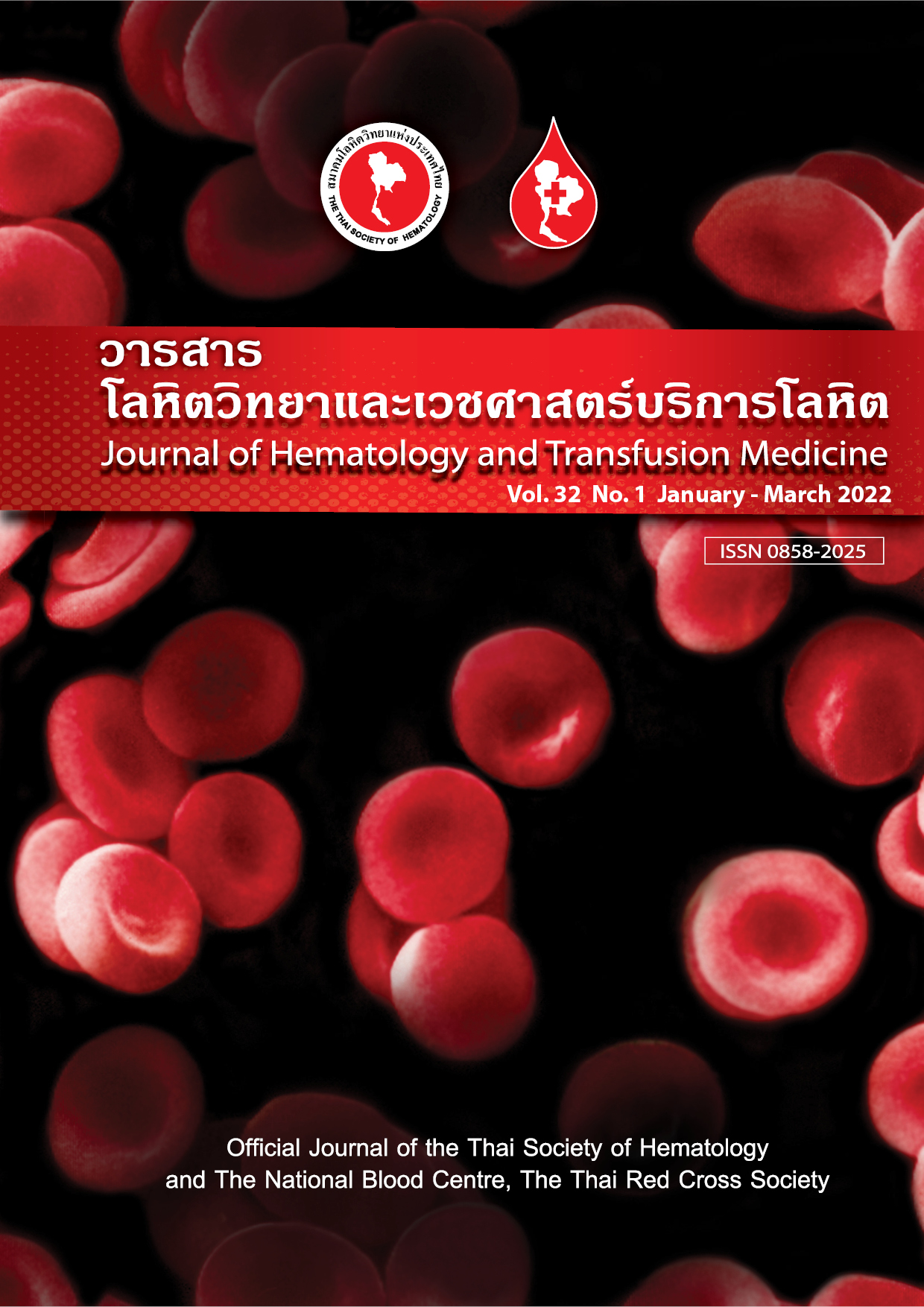การวิเคราะห์สาเหตุการปฏิเสธผู้บริจาคโลหิตในกระบวนการคัดกรองก่อนบริจาคโลหิต ณ ภาคบริการโลหิตแห่งชาติ จังหวัดภูเก็ต
Keywords:
Donor screening, Donor deferral, Hemoglobin, การคัดกรองผู้บริจาคโลหิต, การปฏิเสธผู้บริจาคโลหิต, ภาวะซีดในผู้บริจาคโลหิตAbstract
Abstract:
Introduction: Safety of blood components is the main goal of blood transfusion services (BTS). To achieve this, blood must be obtained from voluntary non-remunerated blood donors (VNRD). Donor screening process is one of the most important steps to protect both donors and patients safety. On the other hand, the deferral leads to precious loss of donors and blood units, moreover rates and reasons are different and vary from region to region. Objective: To analyze the rates and reasons for deferral of blood donors at Phuket Regional Blood Centre. Materials and Methods: This retrospective study was conducted by using the data from the donor deferral registry, Hematos II G program, basing on the criteria of the donor guideline, National Blood Centre, Thai Red Cross Society, during a 5 years period from January 2016 to December 2020. The reasons for deferral of these disqualified blood donors were evaluated. The deferred donors were further classified into 4 categories as (1) donor criteria, (2) questionnaire, (3) medical examination, and (4) hemoglobin level. Results: Of the potential 65,397 donors who registered for blood donation, 37,004 (56.58%) were female and 28,393 (43.42%) were male. The majority of the age group was 31-40 years (27.94%). All of these blood donors were voluntary non-remunerated blood donors (VNRD) from walk-in and mobile session. Among a donation registered of 230,370, only 169,457 (73.57%) could pass the donor screening criteria and, the 60,859 (26.43%) were deferred. The deferral rate (%) of categories 1, 2, 3 and 4 were 6.81, 30.58, 16.94 and 45.67, respectively. Conclusion: The overall deferral rate for any reason in this study was 26.43% which was higher than other studies, especially in first time donor (38.57%) compared to repeated donors (22.99%) and female was much higher (77.93%) than male (22.07%) which were similar to the previous studies. The main reasons for deferral were low hemoglobin level (45.67%) and failed to pass the questionnaire (30.58%). However, the nutritional advice and iron supplement should be given to all blood donors in order to become regular repeated donors. It might also note that the donor deferral registry program should be maintained to improve the donor safety and blood supply.
Downloads
References
National Blood Centre, Thai Red Cross Society. National blood policy. Bangkok: Udom Suksa; 2010.
National Blood Centre, Thai Red Cross Society. Standards for blood banks and transfusion services. 4th ed. Bangkok: Pimdee; 2015.
National Blood Centre, Thai Red Cross Society. Blood donor selection guideline. 6th ed. Bangkok: Udom Suksa; 2017.
Kulkarni N. Analysis of donor deferral in blood donors. J Evol Med Dent Sci. 2012;1:1081-7
Ekwere TA, Ino-Ekanem M, Motilewa OO, Ibanga IA. Pattern of blood donor deferral in a tertiary hospital, South-south, Nigeria: a three-year study review. Int J Blood Transfus Immunohematol. 2014;4:7-13.
Phikulsod S, Chiewsilp P. Reformed donor care, the Thai Red Cross Society. J Hematol Transfus Med. 2015;25:3-5.
Shrivastava M, Shah N, Navaid S, Agarwal K, Sharma G. Blood donor selection and deferral pattern as an important tool for blood safety in tertiary care hospital. Asian J Transfus Sci. 2016;10:122-6.
Spekman MLC, Van Tilburg TG, Merz EM. Do deferred donors continue their donations? A large-scale register study on whole blood donor return in the Netherlands. Transfusion. 2019;59:3657-65.
Priya ES. Retrospective analysis of patterns of donor deferral among blood donors in a tertiary care hospital. Int J of Contemporary Med Research. 2019;6:A6-9. doi: 10.21276/ijcmr.2019.6.1.28
Lappipat P, Chiewsilp D, Phikulsod S, Jiwanuntavat W, Chaiwong K, Meemuk T. Blood donor care for sustainable blood donation. J Hematol Transfus Med. 2019;29:2-6
Kandasamy D, Shastry S, Chenna D, Mohan G. Blood donor deferral analysis in relation to the screening process: A Single-center study from Southern India with emphasis on high hemoglobin prevalence. J Blood Med. 2020;11:327-34.
Syed MA, Singh L, Thakur A. A Study of 507 deferred blood donors, for the evaluation of causes of their deferral, at the blood bank of a tertiary care hospital. Ann Int Med Res. 2020;6:16-20.
Brittenham GM. Iron deficiency in whole blood donors. Transfusion. 2011;51:458-61.
Boulton F. Evidence-based criteria for the care and selection of blood donors, with some comments on the relationship to blood supply, and emphasis on the management of donation-induced iron depletion. Transfus Med. 2008;18:13-27.
Downloads
Published
Issue
Section
License
Copyright (c) 2022 Journal of Hematology and Transfusion Medicine

This work is licensed under a Creative Commons Attribution-NonCommercial-NoDerivatives 4.0 International License.



